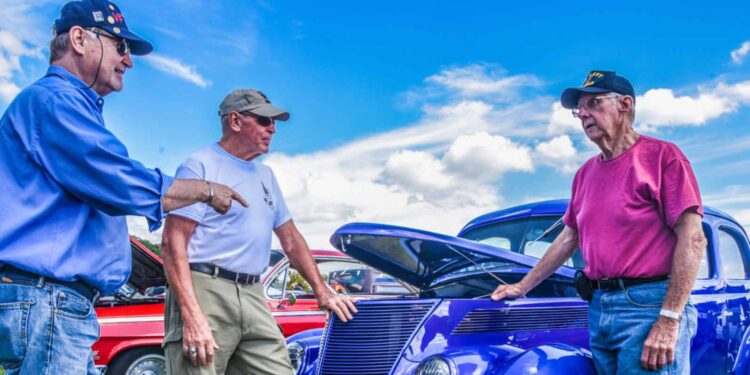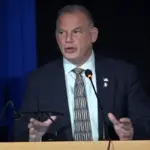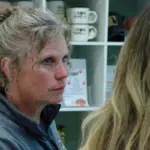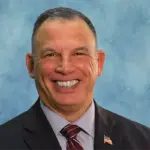by Elena Bittenger | Photography by Phil Grout
There’s nothing like the military life,” says veteran Carl Wesneski. “It’s a warrior’s society,” where those who serve are instilled with discipline, structure, mental strength and a sense of purpose.
Wesneski wasn’t a typical recruit. He was older and had already completed a degree, but at 28, his mind was still set on the military. So he enlisted in 1989.
“You have to immerse yourself into military life.” he said. “Everything is geared towards the mission.”
At the end of his eight years of service, he came home and smoothly transitioned back into civilian life.
But not all veterans are that fortunate.
In 1979, John Timlin was 19. He also lived a regimented life designed by the country he loved and respected.
“We were disciplined. There were rules and regulations to live by. And you don’t break them,” Timlin said.
Twenty-four years later, he left the military suffering from recurring trauma, and his transition back to civilian life was anything but easy.
“Counseling only does so much,” Timlin said, noting that he’s able to speak more openly with fellow soldiers. “There’s a closeness between soldiers, and that becomes a brotherhood, which only other soldiers understand.”
“We live with war for the rest of our lives. The nightmares — the smells — they stay with us. They never leave,” Timlin said.
Veterans face a gamut of challenges that range from mental to emotional, from financial to physical. And for many vets, these problems can be difficult to talk about, embarrassing to share and hard to define. In an effort to help meet the needs of local veterans, the Carroll County Veterans Independence Project (CCVIP) is slated to open the doors of a new veteran service center in the fall of 2020.
CCVIP is a nonprofit organization with a mission to provide services to the approximately 13,000 veterans living in Carroll County and nearby communities.
CCVIP President Frank Valenti, a veteran himself, is working with other community volunteers to raise the funds necessary to refurbish the 1961 Army Reserve building on Malcolm Drive in Westminster into a facility that will welcome all local veterans needing housing and transitional services.
Valenti described the future center as “a haven out of the storm of your life” — a safe place for veterans and their families.
The overarching goal is to help veterans successfully reintegrate into civilian life and into the labor force, while ensuring their physical, mental and emotional needs are being addressed.
When renovated, the center will provide housing services, mental and physical health services, job training services and other transitional services to help veterans find their way.
It will be “a center point of all veteran services — a single place to go for any and all assistance that is accessible to veterans,” says Ed Cramer, a veteran and CCVIP vice president.
Housing services will include shelter space, a kitchen and dining room area, a dayroom lounge and transportation. The center will include 20 rooms for both single veterans and veterans with family.
Shelter services will last up to two years, Valenti said. The first year, veterans will live in the main building, and for the second year, they will live in small homes on the Center’s property, according to Valenti, “still on the property and still benefiting from the services we offer but having their own space.”
The kitchen will have a store where veterans can grab breakfast and lunch during the day. In the evening, a meal will be prepared for everyone.
“There are homeless veterans that want to remain homeless,” Valenti said. “But they can remain homeless and still get food here.”
The dayroom lounge will have a few televisions and couches for leisure time, “but nobody will be lounging all day,” Valenti said. “Anybody staying here has to volunteer in the community.”
Mental and physical health services that will be offered at the center include assistance from Veteran Affairs, emotional and social support from fellow veterans and community volunteers, and mental and physical health services from outside professionals.
“We want them to feel that they are not alone,” Valenti said. Meeting and speaking with fellow veterans and community volunteers will establish camaraderie and integration, “so that they will feel a part of the community.”
Veterans will also have access to job training services at the center, including onsite job training, education programs, and internships and mentoring opportunities. Training and education programs will be tailored to the veteran and will include resume writing, interview practice and job searches.
Specific job training will take place in a separate building where veterans can learn trades such as plumbing, HVAC maintenance, electrical work and welding, Valenti said.
“We want to help them solve their problems, like giving them a workable skill so they have something to fall back on,” Valenti said.
Education programs, like pursuing a degree or taking technical online courses, will also be accessible to veterans, Valenti said, suggesting that with enough people he could bring college instructors on site for training and education.
But these services won’t come cheap. According to Valenti, $2.5 million is needed to break ground and $4.5 million is needed to open the center’s doors. Fundraising is underway and support has already been received from the Kahlert Foundation and Point Breeze Credit Union as well as from federal and state entities, veteran service organizations and the community.
Valenti hopes to have the center running in fall of 2020.
“This gives us hope, something to hang on to. Because without hope, you don’t have a desire to live,” Timlin said.
For more information, visit www.carrollcountyvip.org.













